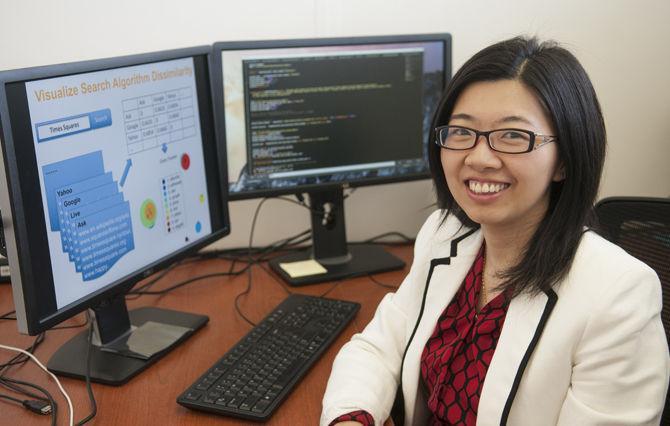When assistant computer science professor Mingxuan Sun sees data, it’s more than a string of numbers.
Sun is researching how data can be used to increase accuracy in online recommendation systems and how data visualization can assist in assessing information. With a background in academia and the tech industry as a senior scientist for Pandora, Sun said she enjoys the applicability of studying data.
“The research can be applied to real world data and can have an impact on real people,” Sun said.
Ensuring accuracy in recommendation systems is important because it impacts users’ search satisfaction and affects their online experience. Her research aims to improve accuracy by cross-comparing content recommendations and collaborative filtering, while balancing disparities in numerical based ranking.
There are a number of ways recommendation systems produce their results, she said. A common approach, content recommendations, compares the content and features of a user’s search and produces similar recommendations.
Another method, collaborative filtering, analyzes data from users who purchased the same product to recommend similar products they also rated or viewed frequently, she said.
In addition to studying the methods behind recommendations, Sun said she is also working to limit the disparities between online ranking systems.
Explicit systems, like a one-to-five user satisfaction scale,
include a significant amount of bias on the part of the user. While one person may rank everything as a five, more conservative users may not rank products or services above a three, she said.
Sun said she is working to take into account each individual’s ranking style on a more graduated scale, to remove bias in recommendation systems. Finally, the information from each recommendation method can be combined to improve recommendation algorithms to enhance the user experience.
“Increasing accuracy of the algorithm can impact millions of users’ search satisfaction,” Sun said.
Sun is interested in applying this information to online students’ educational experiences. Students learn at different paces and in different ways, so improving how recommendations produce learning material can help individual students in their development, she said.
Improving the user experience isn’t limited to improving recommendation systems. Sun’s research also includes translating data into visual representations to inform users and help researchers learn about the applications of data.
Her current visualization study involves illustrating search engine algorithm dissimilarity. Sun is comparing a number of search engines to determine the variations in their search results.
The results are then translated into a comparison table, and the differences between the search engines are illustrated through an intuitive data map, she said.
Computer science department chair Bijaya Karki said Sun’s research is important because the amount of data available is increasing rapidly, as every online service and activity produces information.
Harnessing this information is important to produce useful suggestions for recommendation systems, he said.
Professor studies online recommendation systems, data visualization
March 7, 2016
Assistant Professor Mingxuan Sun, pictured in her Electrical Engineering Building office Monday, March 7, 2016, conducts research concerning machine learning, data science and visualization.
More to Discover








